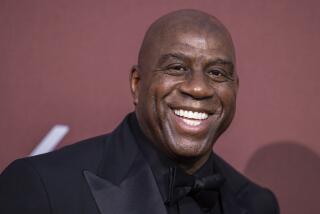MAGIC RETIRES AGAIN : There Are No Simple Explanations : Psychologists: The experts are left to wonder what motivated sudden change of heart.
- Share via
Four and a half weeks ago, Magic Johnson stood before the glare of television cameras and flash photographers, basking in the joy of his return to professional basketball.
Saying, “This is what I do, and this is what I love to do,” Johnson ended the abrupt retirement he had announced on Nov. 7, 1991, after learning he was HIV-positive.
The euphoria, however, did not last long, and Johnson retired again Monday, four days before the start of the NBA season.
Saying he did not want controversies surrounding his return to overshadow the game, Johnson walked away without fanfare--he did not even attend a Forum news conference to announce his decision.
It was one of the most sudden turnabouts in Johnson’s illustrious career, and an aberration of character.
So what gives?
“If he hasn’t said it, I would infer that (the controversies) have started to get to him,” said Jay Coakley, director of the Center for the Study of Sport and Leisure at the University of Colorado in Colorado Springs.
Sports psychologists and sociologists interviewed Monday said that Johnson’s retirement could be the effect of a combination of factors. None of the experts have talked to Johnson, but all have closely followed his situation since last year’s stunning announcement that he had contracted the human immunodeficiency virus.
Coakley, for one, believes there is more to the decision than is being said.
“There is something going on here,” he said. “After listening to things Johnson said about how he sees basketball, how he missed the big games, he missed going one on one with all those talented people. Something is happening here behind the scenes leading to the second retirement.”
Not so, said Lon Rosen, Johnson’s agent.
“There was no hidden agenda or anything like that,” Rosen said.
Steve Heyman, a clinical psychologist at the University of Wyoming, said Johnson was put in an uncomfortable situation in that either alternative--to play or not--would have left him unsatisfied.
To continue, with the threat of rumor and innuendo remaining, had to be weighed against his giving up something he loves, Heyman said.
“The level of hostility might have escalated had he continued to play,” Heyman said. “I can see where someone wouldn’t want to continually have to deal with that.”
Johnson’s decision came on the heels of recent published reports that other NBA players were concerned about playing against him. He also was reacting to rumors about his sexuality and how he got the disease. Johnson has repeatedly said he contracted HIV during heterosexual sex.
“This disease has produced so many different levels of response, it is always hard to predict,” said Richard Lapchick, director of Northeastern’s Center for the Study of Sport in Society.
Lapchick said that Johnson’s latest response is a sensitive one, considering he did not anticipate the fallout over his return.
“Once he saw it, (perhaps) he decided to make the change,” Lapchick said.
If so, some wondered why Johnson, one of the game’s greatest players, participated in the Barcelona Olympics and last year’s NBA All-Star game.
The controversies may die out, with Johnson retired again, but at 33 he must now find an identity beyond sports, experts said.
When he retired last year, his identity had almost exclusively been framed in basketball, Coakley said.
“In the short run, when he retired, what happened was that people wanted to impose a new identification on him,” he said. “HIV-positive person, potential AIDS victim, and he obviously wasn’t comfortable with that.”
Coakley said that many athletes who have defined themselves within a sport have no way of reaffirming who they are.
“I’d argue that is one reason Magic went back to basketball,” he said. “He couldn’t see himself on any other terms.”
When Johnson left the court, he no longer was in control, experts suggested. For example, Johnson had to rely on others for advice while serving on the National Commission on AIDS.
“The excitement and challenge was muted by the fact Magic wasn’t prepared for this game,” Coakley said. “It hardly took the place of basketball with providing him with a source of self-identification.
“Athletes are often like chronic teen-agers. They have terminal adolescence. It takes awhile for alternative identifications to sink in and become salient after our lives have been so taken up with a single identification.”
For Johnson, it means reaching a new plateau in life.
More to Read
All things Lakers, all the time.
Get all the Lakers news you need in Dan Woike's weekly newsletter.
You may occasionally receive promotional content from the Los Angeles Times.








